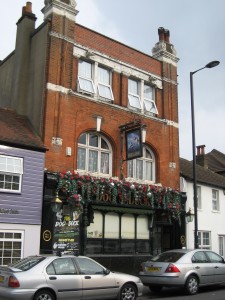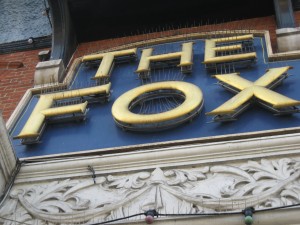The Dog and Duck, Hoppers Road

Technically just within the boundary of Winchmore Hill, the Dog and Duck gave its name to Bourne Hill’s previous incarnation, Dog and Duck Lane. Like the Woodman, it was originally two cottages, which in the eighteenth century gained a licence to sell ale.
In 1869, according to Gary Boudier, the Dog was the scene of an accidental shooting when the landlord John Downes caused the death of his lodger John Flaxman by shooting him in the head. The two, according to the landlord’s mother, had been about to go out shooting, but as Downes left the tap room with Flaxman walking ahead of him, the door closed, catching the hammer of the gun and causing it to go off. Part of Flaxman’s head was shot away, though he lived for an hour after the accident. A verdict of accidental death was returned, through Downes was admonished by the magistrate for being careless where guns were concerned.
The Fox, Green Lanes

The present Fox was rebuilt in 1904 to replace a previous incarnation which had been on the site for several centuries.
The first record which Gary Boudier finds of the Fox in his 2002 book, A-Z of Enfield Pubs (part 2) is in 1683, in the will of Katherine Alces of St Mary Aldermanbury, who in that year left the Fox to Hannah Cooper and her descendents. Boudier also refers to the question of whether the name The Fox, came from the Fox Lane, or Fox Lane was named after the pub: he discovered from the English Place Name Society that there was a family with the name of Fox who lived in the western end of the lane in the 14th century. He also finds that the pub was for two periods in the 18th century briefly called The Doe.
Pictures of old Palmers Green show a quaint building with benches outside in a still rural setting. On warm days, says Alan Dumayne, beer was sold through the window. At the rear there was stabling and a skittle alley and sheds which housed the two horse buses, a service into central London run by the Davey family, who were landlords for over a century.
The Fox was purchased by John Donithorne Taylor in the 1860s, according to Bernard Byrom and Gary Boudier, possibly as a result of an incident in which the landlady frightened Donithorne’s horses by shaking her carpets, and failed to be appropriately penitent. It was then sold in 1902 as part of the Taylor estate, and bought by Huggins & Co brewers, who took forward its redevelopment.
The new building built in 1904 was a rather more grand and elaborate Edwardian building, in keeping with the character of the new town emerging around it. I have not been able to uncover any early illustrations of the inside of the pub (though Gary Boudier’s book has some fascinating illustrations of the old building just before demolition, and floor plans comparing the old and new Fox), but a glance at some of the more intact Edwardian pubs within a five mile radius indicates that the Fox may once have had a stunning interior. (Was this the pub which Stevie Smith described as selling ‘gin and cyclists teas’, or was it the Woodman or the nearer Dog and Duck?).
In the 1980s and 1990s the back rooms of the Fox (as The Fox Theatre) became home of several theatre companies in succession, including in 1996 the Fact and Fable Theatre Company, whose performance of Pin Money by Malcolm Needs was directed by June Brown, Dot Cotton of Eastenders. It was during another performance in November 1996, says Boudier, that a Mr Sullivan from Archway felt himself being tapped on the shoulder but turned to find no one there. Bar staff and customers also reported unexplained noises, only some of which were attributable to the effects of alcohol.
The Fox is still at the heart of Palmers Green, as a pub, music and comedy venue and a number of well known names have performed there including Geno Washington and the Ram Jam Band, and comedians Richard Herring, Phil Nicholl and Simon Munnery. Comedy offerings at the Fox are run by Electric Mouse Comedy Collective, who describe their enterprise as a heady blend of ‘socialism, capitalism, collectivism and egotism’ aimed at supporting new comedians writers and promoters (see http://www.electricmousecomedy.com/ for more information about forthcoming events). There is also traditional Irish music each Sunday from 6.30 and a locally famous Sunday Carvery.
The Fox’s website is keeping schtum about the ghost http://www.thefoxpalmersgreen.com/
The Woodman, Bourne Hill
The Woodman, originally consisting of two cottages built in 1727, began selling ale in 1868 under the ownership of retired police sergeant Henry Wale. Its position, opposite the Pound, resulted in the locally famous quip that the Woodman is the only pub where pints are sold by the pound – landlord Henry Reed was at the turn of the century the last person to hold the title of Pinder. Though much extended, the Woodman is still a nice old pub which retains some of its cosy interior and atmosphere.